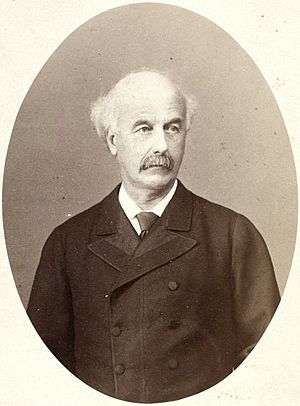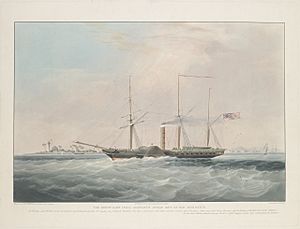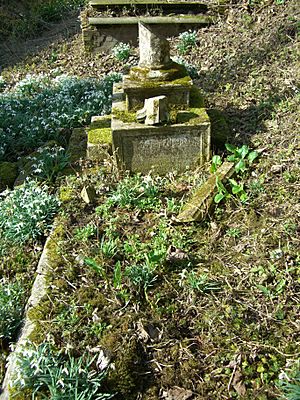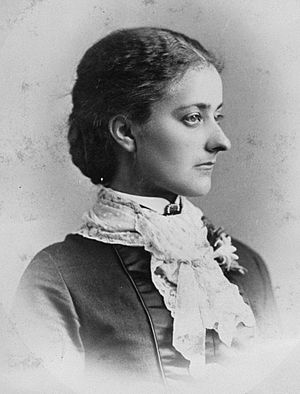Lewis Pelly facts for kids
Quick facts for kids
Lewis Pelly
|
|
|---|---|

Sir Lewis Pelly, 1882 photograph
|
|
| Born | 14 November 1825 Minchinhampton, Gloucestershire, England |
| Died | 22 April 1892 (aged 66) Falmouth, Cornwall, England |
| Allegiance | |
| Service/ |
|
| Rank | Lieutenant General |
| Awards | Knight Commander of the Order of the Star of India |
Lieutenant General Sir Lewis Pelly (born November 14, 1825 – died April 22, 1892) was a British officer. He worked for the British East India Company and later for the British Empire. Towards the end of his life, he became a Conservative Member of Parliament (MP). He represented Hackney North from 1885 to 1892.
Contents
Early Life and Education
Lewis Pelly was born in Minchinhampton, England. His father was John Hinde Pelly. Lewis Pelly attended Rugby School, a famous boarding school. His uncle, Sir John Henry Pelly, was a very important person. He was the Governor of the Hudson's Bay Company and the Bank of England.
First Steps in India
Pelly joined the East India Company in 1840. This company ruled large parts of India for Britain. In 1841, he became an ensign in the Bombay Army. He served in a region called Sind before it became part of British India. He was promoted to lieutenant in 1843.
In 1851, Pelly took on a political role. He worked in Baroda State, helping with an investigation into corruption. He then moved to the civil service in Sind Division until 1856. He became a captain in 1855.
During the Anglo-Persian War (1856–1857), Pelly was an aide-de-camp. This means he was a personal assistant to General John Jacob. He also commanded a group of cavalry soldiers. After the war, he worked as a judge in Karachi in 1859.
Working in Persia
From 1859 to 1860, Pelly was a secretary at the British legation in Tehran, Persia. A legation is like a small embassy. He later became the main diplomat there, called a chargé d'affaires.
Pelly was sent on a special mission to Herat. This city is now in Afghanistan. The goal was to stop Russia from gaining too much influence there. In September 1860, he traveled to Herat with a small group. From Herat, he continued his journey to other cities like Kandahar.
A Traveling Political Agent
In 1860, Pelly rode a horse from Tehran almost all the way to Calcutta in India. This impressive journey caught the attention of Sir Bartle Frere. Frere was a key supporter of the "Forward Policy." This policy aimed to expand British influence in strategic areas. Frere became a mentor to Pelly.
In 1861, Pelly visited the Comoros Islands and Mozambique. He was shipwrecked on one of the Comoros islands. In May 1861, he helped place Bahrain under British protection.
Pelly then became a political agent and consul in Zanzibar. At that time, Zanzibar was a major center for the Indian Ocean slave trade. Pelly was involved in a dispute about payments between Zanzibar and Oman. He supported the ruler of Zanzibar.
From Zanzibar, Pelly also visited the Seychelle Islands in 1862. He then returned to Persia as a political resident from 1862 to 1872. He helped plan and lay the Persian Gulf Telegraph Cable. This cable was important for quick communication between India and Europe.
In 1865, Pelly visited Riyadh to meet the ruler of the Second Saudi State. He wanted to encourage trade in the region. He explored the inland area called the Nejd and even made a map. On his way back, his ship, the SS Berenice, caught fire. Pelly and others had to escape in lifeboats.
In 1867, a war broke out between Qatar and Bahrain. In 1868, Pelly sailed to Bahrain with several British warships. He helped to remove the ruler of Bahrain and put his brother in charge. On September 12, Pelly signed a treaty that recognized Qatar as an independent state.
Pelly received several promotions during this time. He became a major in 1861, a lieutenant colonel in 1866, and a colonel in 1871.
Fighting Slavery
From 1872 to 1873, Pelly joined Sir Bartle Frere on an important mission. They traveled to the east coast of Africa to fight against the slave trade. Their goal was to end the slave trade in Zanzibar. Although they couldn't end it immediately, the British consul, John Kirk, succeeded shortly after.
Return to India
On June 21, 1873, Pelly became the agent to the governor general of Rajputana. He held this position until 1878. During this time, he was involved in the "Baroda Crisis." The ruler of Baroda, Malhar Rao Gaekwad, was accused of trying to poison a British official. Pelly took over the case. He had Malhar Rao arrested and put on trial. Malhar Rao was removed from power. Pelly was knighted in 1877 for his service.
In 1876, Lord Lytton became the new viceroy of India. He wanted to send Pelly to Kabul, Afghanistan, as an envoy. However, the ruler of Afghanistan refused this offer. Pelly tried to negotiate, but the discussions failed. The Second Anglo-Afghan War began the following year.
Later Life and Politics
In 1878, Pelly returned to the United Kingdom. In 1885, he was elected as a Conservative MP. He represented the new constituency of North Hackney.
Pelly also became a director of the Imperial British East Africa Company. In 1892, there was a discussion in Parliament about a railway project in East Africa. Pelly and other directors of the company voted on a grant for this railway. Some people felt this was a conflict of interest because they would benefit financially. Parliament decided that their votes should not count.
Lewis Pelly passed away in Falmouth on April 22, 1892. He is buried in Merstham, Surrey.
Awards and Recognition
- Companion of the Order of the Star of India (C.S.I.), 1867
- Knight Commander of the Order of the Star of India (K.C.S.I.), 1874
Family Life
In 1878, Lewis Pelly married Amy Henrietta Lowder. She was born in 1847. Her father was a chaplain in Shanghai and died when she was young. Her mother later married Rutherford Alcock. Amy Pelly passed away in 1924.
In 1882, Lewis and Amy Pelly lived in Eaton Square, London. They did not have any children.
 | Valerie Thomas |
 | Frederick McKinley Jones |
 | George Edward Alcorn Jr. |
 | Thomas Mensah |




